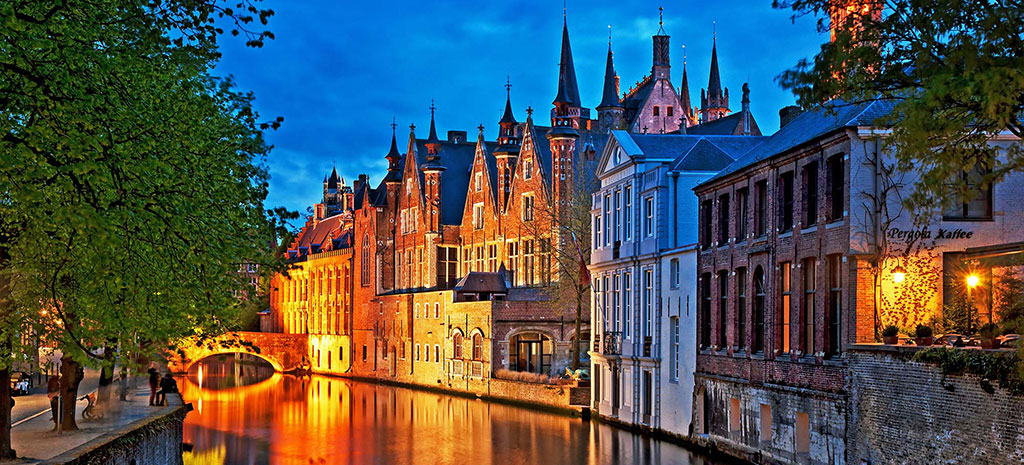
Study in Belgium
Last edited on 04 Mar 2026
Hi! Welcome to Belgium!
Home to the European Parliament, the European Commission, the European Council, and other European Union institutions as well as international organizations such as the NATO, Belgium has a friendly, cosmopolitan, and international society right in the heart of Europe. Belgium, one of the founding members of the European Union, also hosts world renowned higher education institutions. No matter you plan to study in Belgium a Bachelor's, Master's or PhD degree, or enroll in a summer study abroad program, the Belgian educational system is designed to provide students with a wide range of subjects and study opportunities. While the usual languages of instruction are French and/or Dutch, you will also find many degrees offered in English, German or any other foreign language that target international students.
The country prides itself on its medieval art cities such as Antwerp, Bruges, Ghent, Liège, Mons and Tournai. Due to its central location and its excellent transport system the other megalopolises of Western Europe such as London, Paris, or Amsterdam, are only a one or two hours train journey away. The capital Brussels is one of the world’s great multicultural cities, home to the main institutions of the European Union, with a very high number of Embassies, international organisations and multinational companies, and a large and diverse expat community.
In short, here are the reasons to study in Belgium: world-renowned universities, excellent opportunities for international networking, famously multicultural and multilingual cities, a host of regional cuisines and specialties, beautiful countryside, overall high quality of life, and, of course, those fantastic Belgian waffles.
Higher Education System
Belgium’s educational institutions, of which some date back to the middle Ages, are known worldwide for their outstanding academic reputation. They offer the broad range of study subjects from bioengineering to fine arts, from aeronautics to nuclear medicine. There are three types of higher education institutions in Belgium: universities, university colleges and postgraduate training institutions. An ever growing number of institutions of higher learning provides programmes in English. The higher education system in Belgium is part of the so-called European Higher Education Area and comprises three ‘cycles’: the first encompasses Bachelor programmes, the second, Master programmes, and the third, PhDs.
A student who has obtained a Bachelor degree can immediately supplement it with a second ‘cycle’ of studies, i.e. a master degree, consisting of at least 60 and in many cases 120 ECTS credits. Master programmes entail interaction between teaching and research and aim to provide students with advanced knowledge and skills in a specific field. The Master programme concludes with a dissertation. An Advanced master degree involves acquiring a specialised professional qualification. Advanced Master programmes are worth at least 60 ECTS credits and are rounded off with a Master’s dissertation, which forms an important part of their assessment.
Meanwhile, a Postgraduate programmes aim, within the framework of further vocational training, to broaden and/or consolidate the skills acquired following a Bachelor or master programme. A certificate is issued after a programme comprising at least 20 ECTS credits. Lastly, a PhD is the highest qualification awarded by universities in Belgium. As well as preparing for their thesis, PhD students take a PhD training programme in order to acquire additional skills that could be useful in their subsequent career in academia or elsewhere. Belgium is a popular destination for International students. Educational standards in Belgium are high, and 7 Belgian universities recently featured in the Global Top 400 of the Times Higher Education World University Rankings 2015-2016, of which 4 are in the Top 200 – the highest of which are KU Leuven ranked 35 and Ghent University ranked 118
Student Cities in Belgium
Brussels
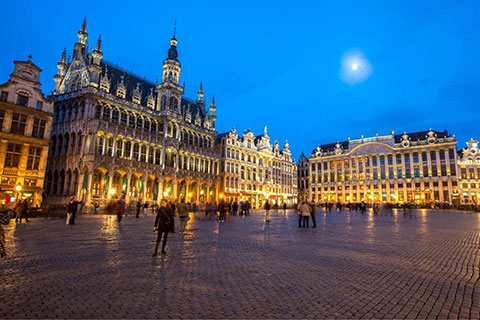
Belgium’s capital has often called the ‘Capital of Europe’, due to the many international organizations that call Brussels home. Since World War II, it has become the administrative center of organizations including the European Union (EU), the North Atlantic Treaty Organization (NATO), the World Customs Organization and EUROCONTROL, to name only a few. So, if you intend to study politics, international relations or perhaps translation studies, Brussels is probably your go-to Belgian city.
The city itself goes beyond its reputation as a center of administration and bureaucracy, offering a thriving nightlife, a world-class collection of restaurants, cafés, bistros and bars, and a unique selection of shopping experiences including open air markets and ‘galleries’ – the latter are historic, covered shopping streets. Although smaller than most European capitals, cosmopolitan and multilingual Brussels offers plenty in the way of culture and recreation.
Notable universities in Brussels include the Dutch-speaking Vrije Universiteit Brussel (VUB), ranked 182nd in the QS World University Rankings® 2016-2017, and the French-speaking Université Libre de Bruxelles (ULB) which is ranked joint 216th. As both of these universities translate into English as the ‘Free University of Brussels’, the translation is rarely used to refer to either university. Other prominent universities in Brussels include Facultés Universitaires Saint-Louis, Hogeschool-Universiteit Brussel and the Royal Military Academy. Several international universities also have campuses in Brussels, including the University of Kent’s Brussels School of International Studies and Boston University Brussels.
Leuven
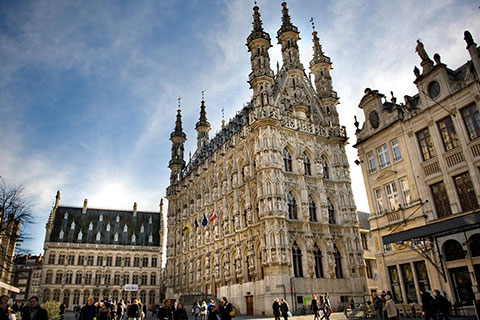
Home to the world’s largest brewer group (Anheuser-Busch InBev), and one of the largest hospitals in Europe (UZ Leuven), Leuven is also known for its notable medieval buildings, annual summer music festival Martrock and its famous Arenberg Orchestra, one of many orchestras based in Leuven. The city also has a rich beer culture, with bars offering a wide variety of local and international varieties – including one bar that claims to offer more than 3,000 different beers! Make sure to pay a visit to the Oude Markt and its numerous pubs, bars and cafés, which have earned it the title of the ‘the longest bar in the world’. While you’re there, see if you can spot the nearby Fons Sapientiae (fountain of wisdom), a famous symbol of Leuven’s student city status.
During term-time, students are a major presence in the city. Leuven is home to the highest-ranked Belgian university, Katholieke Universiteit Leuven (currently 79th in the QS World University Rankings). Also known as KU Leuven or the University of Leuven, this is Belgium’s largest university, with more than 57,300 students. It’s also believed to be the oldest university in Belgium, and the world’s oldest Catholic university still in existence.
Other universities in Leuven include the autonomous Vlerick Business School (a management school shared by Katholieke Universiteit Leuven and Ghent University), as well as a number of vocational universities such as the Katholieke Hogeschool Leuven (KH Leuven) and the university college Groep T (Group T), which offers engineering and teaching courses. Leuven is also home to one of Belgium’s most famous conservatories, the Lemmens Institute, which is especially well known for its music therapy programs.
Liège
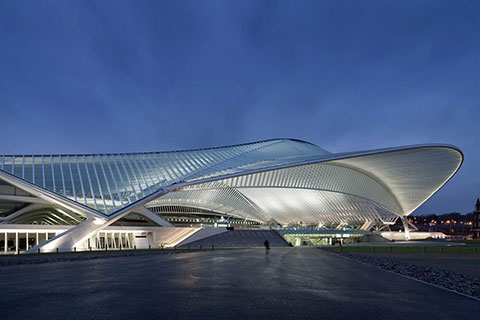
Liège is a large industrial city in Wallonia, serving as the region’s principle economic and cultural center. While its main industries are coal, steel and gunsmithing, Liège is also well known for its crowded folk festivals, nightlife, annual jazz festival, alternative cinemas, and for hosting one of the oldest and biggest Christmas markets in Belgium. The city also boasts one of Europe’s strongest digital, technological and internet-oriented services industries.
Other attractions in Liège include a range of museums, 16th and 17th century architecture, the 400-step stairway “Montagne de Bueren”, and the Saint Nicholas festival – organized by and for university students, involving dressing up in dirty lab-coats and begging for money for drinks. Liège has a pedestrian zone known locally as ‘The Square’ where you can find plenty of pubs, many of which stay open until 6am – or until the last customer leaves. Liège is also home to a large Italian community, along with large numbers of Moroccan, Algerian, and Turkish immigrants.
The city is a major educational hub, home to over 20,000 students, both local and international. The University of Liège is ranked joint 315th in the QS World University Rankings 2016-2017, and is also known for its HEC Management School. Other prominent higher educational institutions in Liège include ISA Lambert Lombard (the Faculty of Architecture of the University of Liège), the Académie Royale des Beaux-Arts de la Ville de Liège (arts school offering undergraduate and graduate courses) and La Haute Ecole de la Province de Liège (college providing undergraduate and graduate degrees).
Antwerp
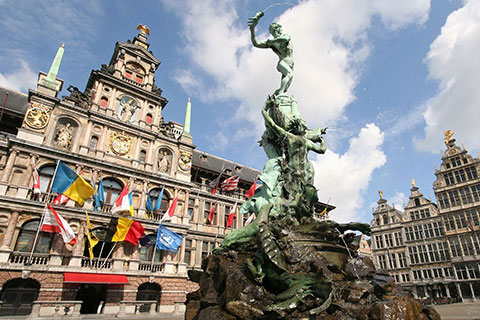
The second-largest city in Belgium, Antwerp is well-known for famous Flemish painter Sir Peter Paul Rubens, diamonds (more than 70% of all diamonds are traded in Antwerp), fashion (of particular note are the Antwerp Six) and for having the second-largest port in Europe. The city also offers a range of interesting attractions, including the Gothic Cathedral of Our Lady and the prestigious Royal Fine Art Museum, as well as many historical buildings from different periods. Even Antwerp Zoo, one of the oldest in the world, boasts impressive 19th century design and architecture.
As you might expect from its strong association with fashion, Antwerp is known as something of a trend-setter. Intellectuals, actors, musicians, writers and painters spend their time in the city’s many trendy bars, cafés and shops – or, indeed enjoying its flourishing jazz scene. Antwerp is also famous for local products such as Bolleke (an amber beer), Elixir D’Anvers (a locally made liquor), and hand-shaped biscuits (connected to local folklore).
Among universities in Antwerp, the most prominent is the University of Antwerp, ranked 209th in the QS World University Rankings and, with 14,000 registered students, the third-largest university in the Flemish region. Antwerp also has several university colleges, including Charlemagne University College (Karel de Grote Hogeschool), Plantin University College (Plantijn Hogeschool), and Artesis University College Antwerp.
Bruges
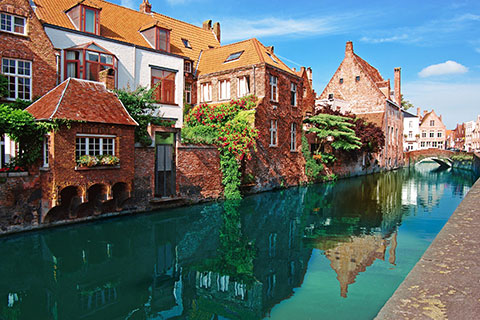
Bruges is known for being one of the most perfectly preserved medieval cities in Western Europe, and its historic city center is a UNESCO World Heritage Site. Its narrow canals and ancient buildings mean Bruges is sometimes referred to as “The Venice of the North”. The city has many famous buildings and landmarks, including an impressive 13th century belfry. Bruges also has a collection of medieval and early modern art, along with plenty of theaters, concert halls, museums and cinemas. The city is host to a range of cultural, music and food festivals and is the starting town for one of the biggest sporting events in Belgium – the Tour of Flanders cycle race.
While its constant influx of visitors gives Bruges a tourist town feel, there’s plenty for students too. The city is an important center for education, with notable universities in Bruges including the Katholieke Hogeschool Brugge-Oostende (KHBO) and the Hogeschool West-Vlaanderen (HOWEST – Howest University in English). Bruges is also the main campus for the College of Europe, which offers postgraduate studies with a focus on European economics, law and politics. Also based in Bruges is the United Nations University Institute on Comparative Regional Integration Studies (UNU-CRIS), a research and training institute of the United Nations University.
Application, Fees and Visas in Belgium
Applying to universities in Belgium
In order to apply to study in Belgium at undergraduate level, you must hold a secondary school leaving certificate that is recognized by the relevant authorities, or an equivalence statement for that certificate. There are different authorities to contact for equivalence statements, depending on whether you’re applying to attend a university in the French Community, in the Flemish Community, or in the German-speaking Community.
Applications to study in Belgium are submitted individually to each university, and specific admissions requirements are set by each institution. In general, those wanting to study medicine/dentistry, arts, management and (only in the French Community) engineering sciences must take an entrance exam. You may also need to take an exam to prove your proficiency in French or Dutch. You’ll also need to pay your tuition fees before you can be fully enrolled.
Tuition fees in Belgium
For Belgian and other EU students, higher education is financed mostly by the state. Nonetheless, students must pay an annual registration fee, for every year of their studies. The amount varies depending on the higher education institution, the type of program and students’ eligibility for financial aid.
Tuition fees in Belgium also differ depending on whether the program is offered by an institution in the Flemish, German-speaking, or French community. Students from the EU will pay a maximum of €835 (~US$910) per year, while international students from outside the EU will pay €835-4,175 (~US$910-4,560) and may need to pay additional registration fees – again, the amount depends on the institution and program. You can obtain specific information about the total fees amount by contacting your chosen institution(s).
Student accommodation in Belgium
University accommodation in Belgium is often readily available for short-term or international students; however, if you wish to rent a private flat, it’s often necessary to sign a one-year contract. Expect to pay between €150 (US$200) and €400 (US$540) per month, depending on whether you prefer university housing or private accommodation, and depending on where you study in Belgium. If you rent your own one-bed apartment, this is likely to cost around €675 (~US$740) per month in a city center, or €500 (~US$550) outside the center.
Home-stays are also popular in Belgium, and give students a chance to learn about Belgian culture first-hand, while possibly improving their language skills. However, this option is more commonly used by short-term students who are, for example, studying in a language school. Contact your university’s student support services or international student department for further information on finding student accommodation in Belgium.
Fast fact
- Official name: Kingdom of Belgium
- Capital city is Brussels – the headquarters of the European Union (EU) and the North Atlantic Treaty Organization (NATO)
- Constitutional monarchy, parliamentary democracy and unique federal government
- Official languages: French, Dutch and German
- The Flemish region (Flanders), the Walloon region (Wallonia) and the Brussels-Capital region each have autonomous regional administrations.
- Three language communities: the Flemish (a form of Dutch) Community in the north, the French Community in the south, and the German-speaking Community in the east
- Borders with France, Germany, Luxembourg, the Netherlands and the North Sea
- Major exports include machinery and electrical equipment, chemicals, finished diamonds, metals and metal products, and foodstuffs.
- Known for delicious chocolates, waffles, French fries and a huge selection of beers
- Currency: Euro (€)
- Major religion: Christianity (Roman Catholic, Protestant)
- An estimated 99% of the adult population is literate.
- More castles per square mile than any other country
- Blankenberge in the Flemish region hosts the largest sand sculpture festival in the world.
- Internet domain: .be








